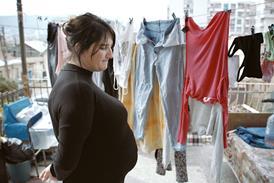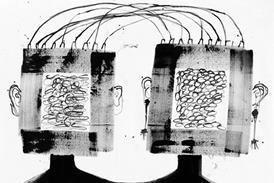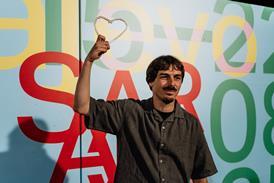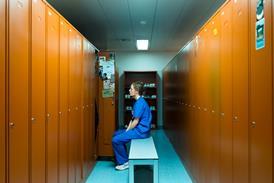
Sarajevo Film Festival’s CineLink Industry Days, taking place from August 16-21, is a “creative bridge” that enables the best local work to cross over internationally and brings international talent and expertise into the region.
Every part of the programme is driven by one of these two aims, says Masa Markovic, Sarajevo’s head of industry.
“Success is not evaluated from year to year. It’s a very long-term process,” Markovic reflects. “The position of Sarajevo is as a discovery festival. We are not only working with established professionals but with people when they are in film school. Success is rated by the relationship we build with film professionals over the years and their return to Sarajevo.”
The event is aimed both at emerging talent and seasoned industry professionals. Around 20% of the 1,200 industry delegates this year are newcomers - emerging producers and filmmakers taking their first steps in the business.
Among the more high-profile industry attendees are Denis Leroy, senior director at Banijay Entertainment working within the company’s central scripted division, who is on the CineLink Industry Days jury, and Billy Bowring, executive producer at UK-Australian outfit See-Saw Films. Both are participating in a session in CineLink’s talks series called Originals, Adaptations, and the IP Balancing Act.
CineLink sees itself as “an ambassador for the whole region,” helping filmmakers from right across the Balkans to raise finance and find coproduction partners, says Markovic. It is also, she points out, an important gateway for Turkish independent producers looking to reach the global market.
CineLink’s masterclasses and debates address the issues that most directly affect the region.
A major topic will be how the Balkan industry is fighting hard to have a seat at the table in ongoing discussions about AI copyright driven by the EU’s AI Act. There is an obvious danger that non-EU member states, including those in the Balkans, will be frozen out of policymaking decisions that directly affect them.
“We cannot escape from AI. We are on a road that is still being constructed,” Markovic notes. “While the AI Act is being negotiated, a lot of people from this part of the world are not part of the EU. Sooner or later, the same requirements will apply to them. For us, it is very important that no one is left behind and that filmmakers from this part of the world are part of these discussions.”
CineLink has drawn representations from a series of heavyweight organisations to Sarajevo to participate in the discussions. Executives from the Federation of European Screen Directors, the European Film Agency Directors Association, the Society of Audiovisual Authors and the European Producers Club are all participating in a session called Artificial Intelligence, Authors’ Rights and Guild Solidarity.
Additionally, a session called Creative Freedom at the Digital Frontier will explore how AI-assisted tools can coexist with moral rights, data transparency, and free circulation of works.
Pendulum
CineLink does not shrink from confronting other equally complex issues. A panel called Integrity, Impact, and Self-Censorship in Crisis-Era Cinema will ask whether filmmakers who may be scared of offending their funders now curb their own creative instincts to such an extent that they risk making increasingly mediocre and anaemic work.
Further panels include one on ’Solidarity Finance’, looking at how initiatives such as the International Film Festival Rotterdam’s Hubert Bals Fund’s Displacement Film Fund can help exiled filmmakers.
Meanwhile, in the Ticking Boxes or Raising Bars session, diversity quotas and ethics protocols will come under scrutiny. “What is very visible in the talks and sessions we put together is the pendulum between creativity and accountability,” says Markovic.
Sarajevo’s importance for documentary in the region has been further heightened by the unexpected closure earlier this summer of the Al Jazeera Balkans (AJB) Doc Film Fest, which formerly took place in Sarajevo in September. CineLink will showcase a tight programme of 11 documentary projects.
“We have a strong curation stamp,” says Markovic of the selection. “When you go to some other events, you’ll have 60 projects in post. Here, you have 11 and you know they are standing out by their quality.”

The documentary works-in-progress strand will showcase projects including Silence Is The Enemy of The Sea from Dina Karaman and Evgeny Rodin, which is set in a psychiatric hospital beside the Caspian Sea, and Bojana Novakovic’s The Forbidden Aunt, about the sexual violence experienced by women in a deeply patriarchal society.
The CineLink Books market is now in its second year and already yielding concrete results. Serbian author and filmmaker Nađa Petrović’s novel Jellyfish Live Forever Until You Catch Them, presented last year, has been optioned for screen adaptation by Croatian outfit Antitalent.
Meanwhile, three years after the full-scale Russian invasion of the country, Ukrainian talent is again well represented throughout CineLink Industry Days. Stanislav Bytiutskyi’s The City, about a young rising star of the electronic music scene in Kherson now traumatised by the war and looking to rebuild his life in Kyiv, is presented in the coproduction market.
Dmytro Hreshko’s Divia, looking at the environmental costs of Russia’s aggression, is in the documentary competition, having won an award in last year’s Docu Rough Cut Boutique.
The financial support on offer to projects from CineLink’s commercial partners helps explain the appeal of the event. In total, €173,000 in cash awards and €100,000 in postproduction and consultancy are available to the 45 projects being presented over the six-day event.
“This year we have introduced three new awards,” says Markovic. “One is a Council of Europe award for series development, worth €50,000, Then we introduced the HBO Award, which is a cash prize of €30,000 to help finalise the film but also to secure an SVOD window. We also have one additional post-production award given by our long-term partner Avanpost, €30,000 in kind, for helping with post-production.”
The main festival programme is jam-packed with films that have passed through CineLink. These include Srđan Vuletić’s coming of age story Otter, which opens the main competition, and Bosnian director Dane Komljen’s Desire Lines, screening in Sarajevo following its well-received premiere in Locarno.
It is a fair assumption that many of the projects being pitched in CineLink this week will surface in Sarajevo and at A-list festivals in the coming months and years.
























No comments yet